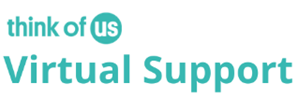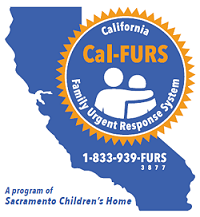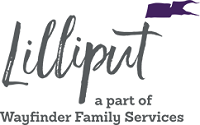Resources for Kinship Caregivers

California Kinship Navigator provides free personal assistants, who make it quick and easy to get the resources you need. This program connects current and former foster youth and caregivers to resources such as: food, housing, employment and education, advocacy, and more! It's presented by the Department of Social Services in partnership with Think of Us. Get support from a personal assistant today!

Family Urgent Response System (FURS) is a Free 24/7/365 Hotline with a coordinated statewide, regional, and county-level system that delivers effective trauma-informed supports for all current and former foster youth and their caregivers. Through phone- based response and county-level in-home, in-person mobile response during situations of instability, FURS preserves the relationship of the caregiver and the child or youth.
Look at FURS for more information and learn how to get immediate help for any big or small issues you may be having.

Kinship Support Services Program (KSSP) is a free program designed to provide resources and support to help improve outcomes for families formed through kinship care. KSSP is funded by some California counties and offered in collaboration with community-based service providers in county specific locations. Look at Kinship Support Services Program to find out if KSSP is offered in the county where you reside.

Foster Kinship Care Education (FKCE) is a community college-based program providing free, in-person and live interactive online classes as part of a child-centered Resource Family Approval process. Classes help resource families including special populations such as American Indian Tribes and families with English as their second language meet RFA training requirements such as Child and Adolescent Development, Reasonable and Prudent Parenting, Effects of Trauma, Permanence, Well-being and Education Needs as well as specialized topics, such as caring for children with special health care needs and understanding the Indian Child Welfare Act. Program offerings vary by college. Please email fkcehelp@cccco.edu to be connected to an FKCE program near you or contact your local county agency to see what training options are available to you. In addition, you may also refer to RFA Program for more information on training requirements.

Foster Parent College (FPC) offers self-paced training courses, available 24/7. These classes can help caregivers understand challenging behavior, recognize the underlying causes of the behavior, and discover fresh ideas to improve the behavior. Many agencies are affiliates of FosterParentCollege.com and accept FPC course certificates for their parents' annual training requirements. All future and current resource parents can utilize the Affiliate Map on the website to find an agency in their area. Please refer to the Resource Family Approval Program for more information on training requirements.


The Caregiver Support Webinar Series consists of live and recorded webinars provided by The California Department of Social Services (CDSS) and the California Alliance of Caregivers (CAC) on topics that have been requested by caregivers. These webinars provide information about the laws and policies that affect caregivers and their foster/kinship children, as well as providing popular resources and information and include discussions from speakers and panels with lived experience. Please follow this link to view a past episode in the series.

The Quality Parenting Initiative (QPI), an advocacy strategy of the Youth Law Center, provides free resources in California. Through QPI, California advocates, including kin caregivers and those who support them, can access a wide range of topics from our nationwide network to improve practice and policy, including topics such as Child and Adolescent Development, Birth and Foster Parent Relationships, Permanence and Stability, Advocacy, Kinship Support, Youth Perspectives, Grief and Loss, Transitions, and many more.
ACL/ACIN:
- ACL 18-42: Family Finding and Engagement (FFE)
- ACL 17-65: Juvenile Court Findings of Due Diligence by Social Workers in Identifying, Locating and Notifying a Dependent Child’s Relatives; Assessing Relatives for Placement of a Dependent Child
- ACL 09-86: Notification of Relatives
- ACL 11-15: NEW KINSHIP GUARDIANSHIP ASSISTANCE PAYMENT (KIN-GAP) PROGRAM REQUIREMENTS
- ACL 11-86: EXTENSION OF KINSHIP GUARDIANSHIP ASSISTANCE PAYMENT (KIN-GAP) PROGRAM BENEFITS AND ADOPTION ASSISTANCE PAYMENTS (AAP) TO AGE 21
- All County Letter (ACL) 17-62 New Authorities for Tribal Background Checks ACL19-71 Tribally Approved Homes
- All County Information Notice (ACIN) I-05-20 Applicant Type for Tribally Approved Homes
- Tribally Approved Homes (TAH) Frequently Asked Questions (FAQs)
- Kinship Guardianship Assistance Payment (Kin-GAP) Program – W&IC 11360-11379; W&IC 11385-11393; ACL 11-67, ACL 14-19, ACL 11-15, ACL 11-15E, ACL 11-15EII; MPP 45- 600 ; Assembly Bill (AB) 12 (Chapter 559, Statutes of 2010)
- Alternate Guardian/Co-guardian – W&IC 11363(e)
- Extended Kin-GAP – W&IC 11386, ACL 11-86
- Fictive Kin for Kin-GAP – W&IC 11391, ACL 14-28; AB 1712 (Chapter 846, Statutes of 2012)
- Successor Guardian – W&IC 11386(i) , W&IC 11391(c) , ACL 15-66
- Nonrelated Legal Guardian (NRLG)/Extended NRLG – W&IC 11405; ACL 12-48, ACL 12- 48E, ACL 11-69, ACL 11-09, ACIN I-76-15, ACIN I-76-15E, ACIN I-29-13
For Additional Information:
Foster Caregiver Policy and Support
Unit 744 P Street, MS 8-13-78
Sacramento, CA 95814
(916) 651-7465
CaregiversForYouth@DSS.ca.gov